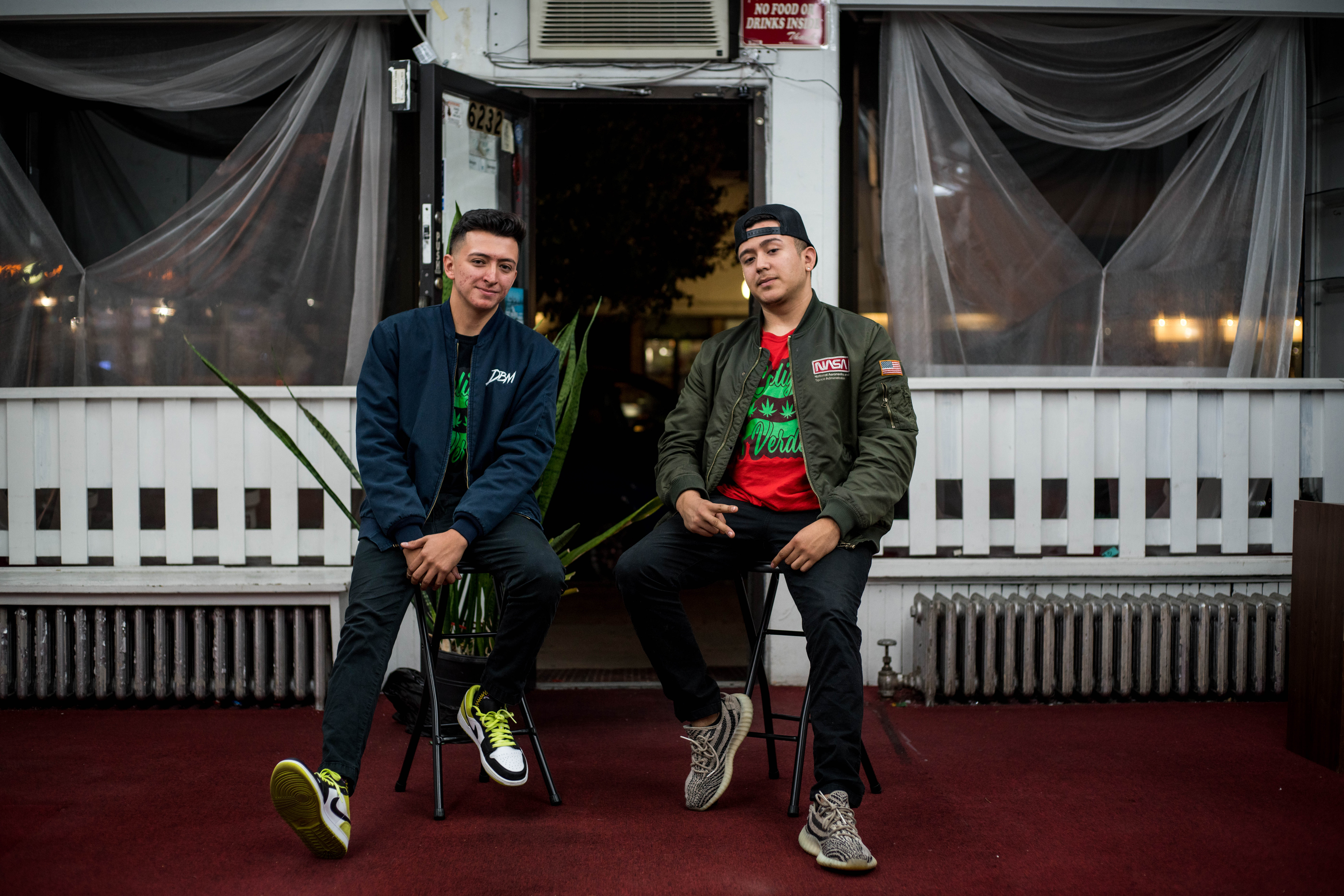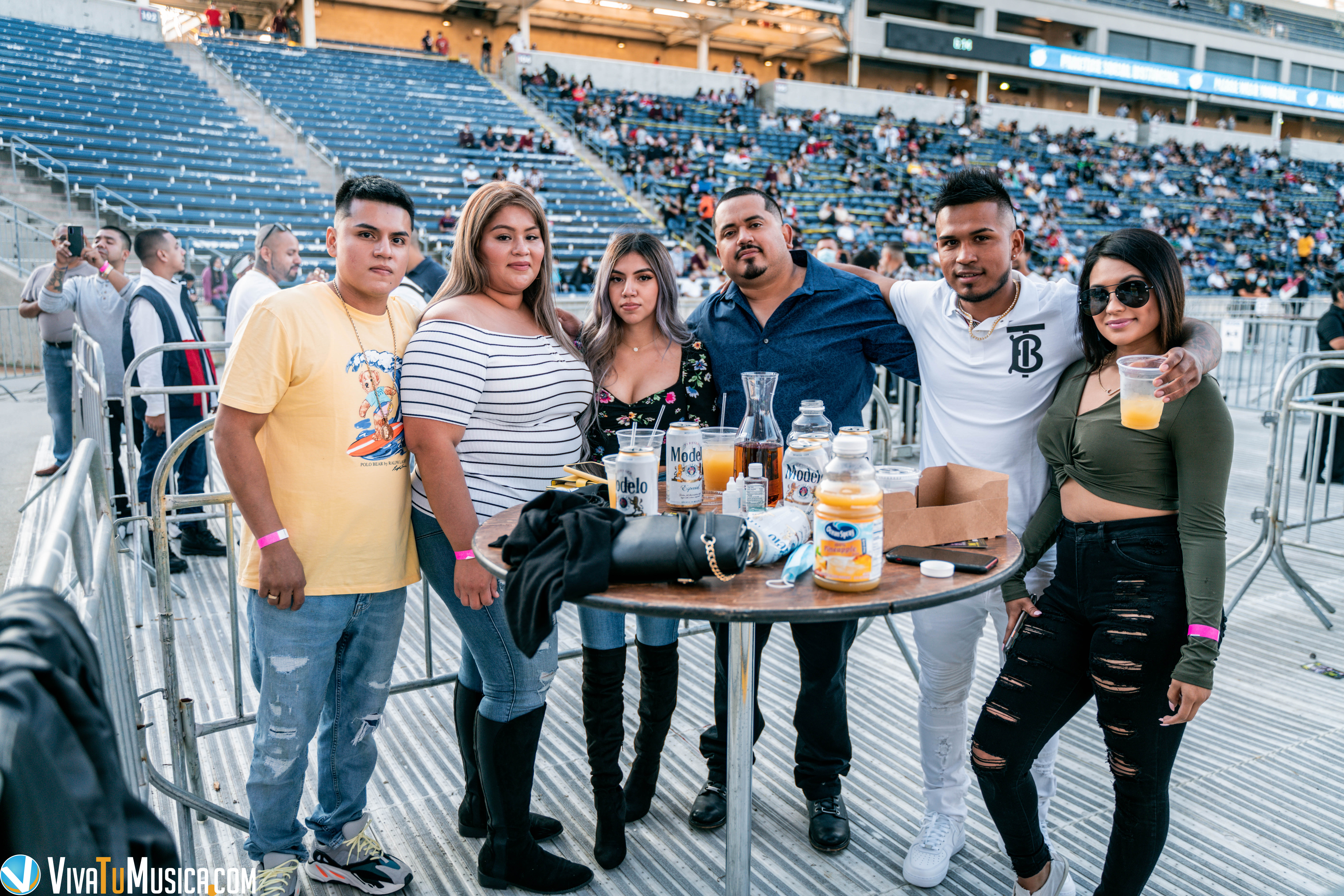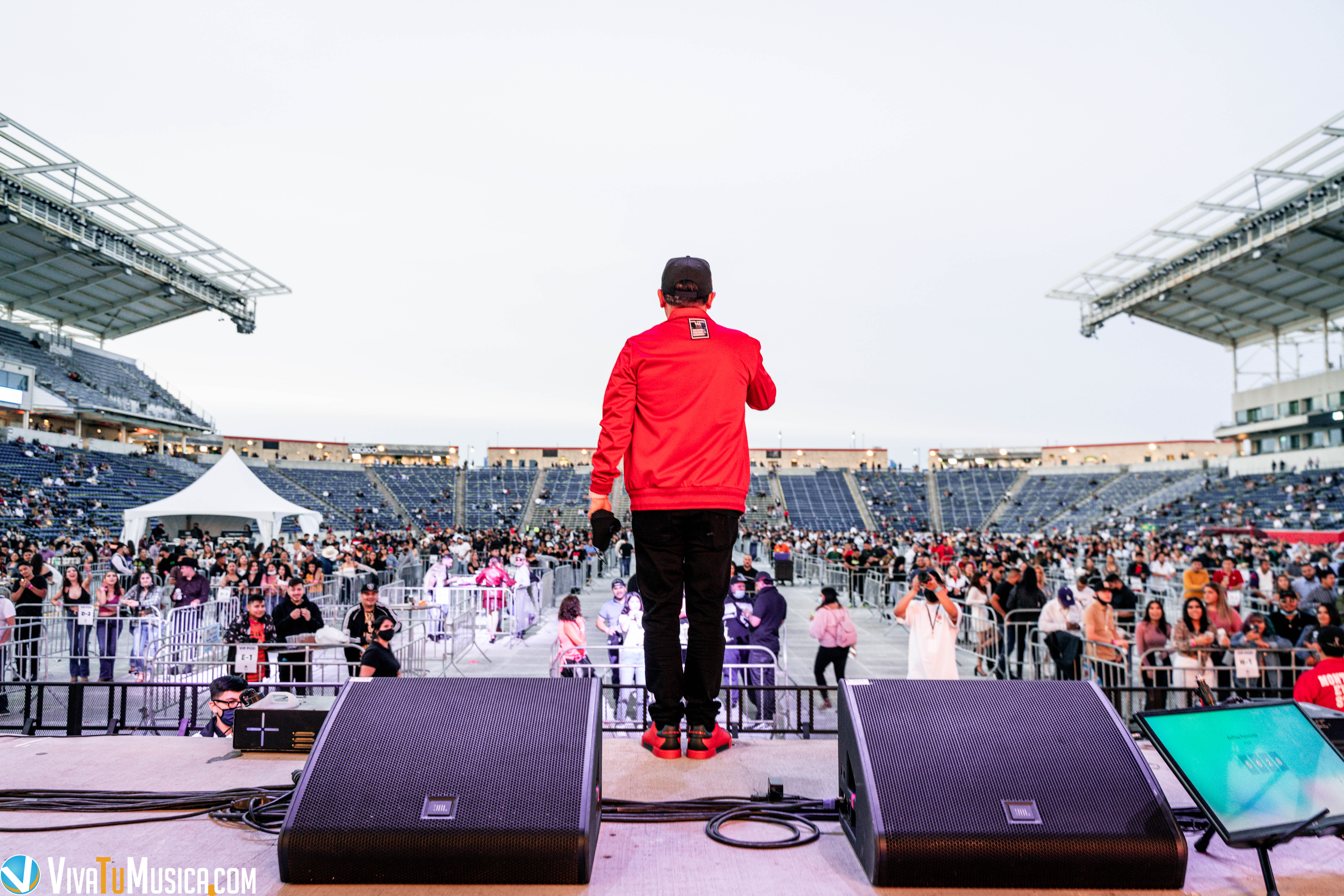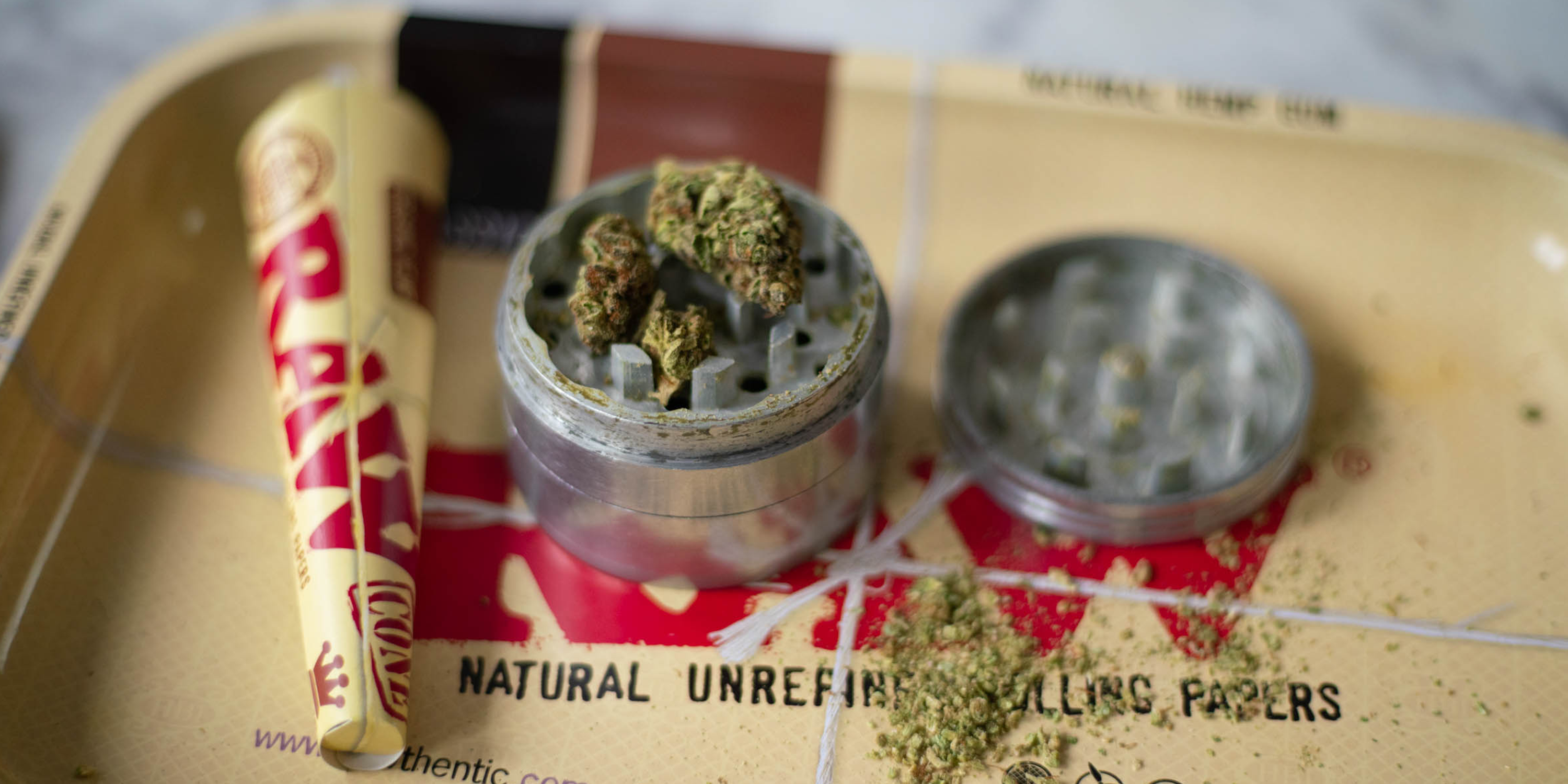Cermak Road in Berwyn, a municipality just outside Chicago, is lined with quinceanera dress shops, the iconic Quinta de Los Reyes restaurant known for its traditional Mexican food and a former photo studio, which now has new tenants — musical group Codigo Verde.
Miguel and Danny Barraza Alfaro are two brothers from the South Side of Chicago. Their family is from Durango, Mexico. Danny founded Codigo Verde back in 2018.
“This is going to be our music school, it’s going to be called DAB School of Music,” says Danny, sitting in the empty storefront.
Danny is the younger of the two and goes by DAB, which refers to his initials. He’s wearing a red Codigo Verde logo tee, has tattoos on both arms and is soft spoken. Miguel is thinner but taller, wearing a navy blue bomber jacket. He’s in the corner taking hits off his dab pen.

Miguel is pictured on the left and Danny sits to his right. The brothers pose inside of their new storefront that will soon be renovated. Picture courtesy of Eddie Rodriguez.
Codigo Verde is a grupo sirreño, which combines the traditional sounds of Mexican folk ballads infused with sounds of trap music. It’s an unlikely combination, but it’s a genre that is taking over the mainstream Spanish music scene.
The group is composed of a tuba, a 12-string guitar and a six-string guitar. Danny is the main vocalist and writer and plays the requinto, a 12-string guitar.
“He shreds that s––t. It’s not conventional the way he be doing the requintazos on there, and a lot of older songs don’t have that style of music,” says Miguel while mimicking hand gestures Danny makes during his performances.
There is not much in the soon-to-be studio. The walls are white except for an accent wall with forest print wallpaper and a reddish carpet. The only pieces of furniture are a glass showcase that has some t-shirts and a green leafy plant.
“It used to belong to the business that used to be here, they were here for 30 years and right before they left they wanted to bless us with some good luck,” Miguel said, referencing the plant holding the door open. They don’t know what kind of plant it is but they are sure that it needs to be repotted. It’s one of the things on their to-do list.
The brothers have big plans to renovate the space and give music lessons to all ages, create a studio for their own music and sell Codigo Verde’s merch. Danny has always had dreams of teaching music. He plays seven instruments and has this idea of hosting open seminars for people that can’t afford music lessons.
“I’ve always wanted to give back to my community, I’ve always been wanting to do that,” says Danny.
Picking Berwyn to open their future music school wasn’t a coincidence. The pair want to give back to the Latino community in Chicago. Berwyn is home to a growing population of Latinos, which currently make up about 65 percent of residents. It made sense to open their studio in Berwyn which is close to Chicago and close to their community.
It’s the Latino community that has well received their music. Codigo Verde has built up a loyal following and their audience is composed of a variety of people, but mainly young Mexican-Americans.
“It’s really crazy when people start memorizing the lyrics to the songs because I’m just one of the spectators too,” says Miguel. Despite their audience being young, Miguel says the older crowd still shows up.
“[Danny] has the older fanbase going crazy because they’re crying thinking about their dead relatives that used to have these favorite songs. But we’re also playing Rancho Humilde’s lineup of new hits and we’re playing our own songs. So the fanbase is random, it’s crazy,” says Miguel.
Miguel is the manager of the group, meaning he handles social media, books gigs and takes on miscellaneous tasks.
“We’re on the fringe, right? We have to incorporate our American experience because we were born here, but our parents and all our musical influences are from Mexico,” Miguel said. “We can’t pretend that we grew up in Mexico, we’re not trying to flex that, but we talk about growing up in Chicago.”
It is this idea of not belonging to one culture or another that has given notoriety to corridos tumbados and corridos verdes. Corridos are popular narrative songs or verses, often about relevant social issues. Sounds that have been familiar for generations have become music that talks about current lifestyles, and that is what’s so appealing.
“Corridos verdes in particular talk about enjoying cannabis use through the music. It’s been so popularized a lot especially within the last three years,” Miguel said, adding that “there have been a lot of groups that have worked to create that. It didn’t start with Legado 7 but they’re definitely one of the main ones that heralded in this new era of Corridos Verdes.”
Corridos in the past have told the stories of the revolution, crossing the border, life in Mexico, the war on drugs and moving those drugs. Sometimes they’re about violence and sometimes they’re about love, but they’re always poetic.
Corridos Verdes came into the mainstream over the last three years but almost everyone attributes the emergence of the new genre to Los Angeles group Legado 7. Alexander Guerra and Ramon Ruiz founded the group in 2014.
Legado 7’s first album was titled, 100 por ciento corridos verdes, launching in 2016. What caught the attention of national ears was the song “El Afro.” The song talks about specific strains, bongs, blunts and pipes. One of the opening verses goes, “El corrido que yo canto no es para un mafioso, es para un marihuano.” That means this corrido isn’t for drug lords, it’s for the potheads.
Since the release of the album, there’s been new groups taking center stage. Record label Rancho Humilde, founded by Jimmy Humilde, who has signed on groups like Legado 7, continues to bring artists to the forefront like Natanael Cano. Cano’s music has taken spot on the Billboard’s Hot Latin Songs and he even collabed with world star Bad Bunny. While most of these artists are based in L.A, Chicago is holding its own. Chicago inaugurated the Smoke Me Out Tour (SMO) back in 2018, a tour largely featuring Rancho Humilde artists and of course, smoke friendly.

Fans pose at SMO tour 2020 in designated section amid pandemic. Courtesy of Eddie Rodriguez.
The SMO tour came back for its third time to SeatGeek Stadium in Bridgeview last year.
“As soon as the concert started and the headliner went on stage everyone got up from their seats and ran up to the front,” Eddie Rodriguez, who photographed the event for Viva Tu Musica, recalled. “They had to pause the concert until everyone went back to their seats. Jimmy was like, ‘You motherf––––s don’t listen, concert’s going to end and I’ma go home with my money,’ or something along those lines.”

Jimmy Humilde addresses the crowd at the start of the SMO tour 2020. Courtesy of Eddie Rodriguez.
Rodriguez said due to COVID-19, fans had designated areas and were told to practice social distancing. The lineup consisted of big names including Fuerza Regida, Natanael Cano, Legado 7 and others. Eddie recalls fans and artists alike lighting up joints and enjoying the night.
“It helps you appreciate things. You don’t need it to appreciate things but it does help, it lubricates that experience,” Miguel said.
And while the SMO tour brings to town the big names, Codigo Verde combines the evolution of regional Mexican music with the Chicago experience, something that cannot be replicated by the big artists.
“I like to drop my music because it kind of gives everybody a taste of Chicago, you know?” Danny said.
Codigo Verde’s music videos almost always showcase elements of life in Chicago. Even their logo features the Chicago flag. The group’s identity has caught the attention of record labels but they refuse to sign onto anyone.
“Because we’re independent we don’t have to get anything cleared, we post what we want, we support what we want,” Miguel said.
Liberty and autonomy are what sets Codigo Verde apart from the rest. We have seen recently artists like Kanye West and Taylor Swift fight for ownership over their masters. Miguel also said that because they’re not part of a bigger label, they can advocate for marginalized communities.
“We have no problem saying Black Lives Matter, we have no problem promoting the protest,” Miguel said.
During the days of protest in Chicago this past summer, the group promoted rallies and made multiple public statements in support for the liberation movement.
“We couldn’t just pretend like everything is fine, let’s drink some Buchanans, let’s play at the club and watch our new video. Who cares about any of that [when] there’s people dying,” Miguel said.
Codigo Verde halted operations during the height of the protest and joined in the community events. They advocate for Brown and Black voices, which intersects with the cannabis industry.
“We see in the music industry the need for owning your masters or basically having your own equity and controlling your own destiny, it’s the same thing with cannabis,” Manny Mendoza, cannabis chef and equity advocate, said.
Mendoza is the co-founder of Herbal Notes, a cannabis supper club in Chicago. With the legalization of cannabis at the start of the year, Mendoza geared up and applied for a craft-grow license, a license that would allow for the cultivation, drying, curing and packaging of cannabis. The legalization of cannabis has also led to the commodification of cannabis. While city programs promise a fair and just system to allocate the licenses, the process is still lengthy and pricey. The application fee was $5,000, which could be reduced if applicants met social equity requirements such as gender and race. However, less than two percent of dispensary owners in Illinois are Black or Latino.
Despite his preparation and being active in the cannabis equity movement and a person of color, Mendoza was not granted the license. He still plans to own a farm and get his craft-grow license someday but has set a new short term goal — a cannabis consumption lounge.
“It’s definitely in a lot of early stages and there’s certainly things that I don’t want to give away, but, yeah, I’m going after a social consumption lounge, which is already in line with what I’ve always done and what I’ve always been about,” Mendoza said.
Like many of his past projects, Mendoza plans to include those affected and impacted by marijuana laws. It’s the act of having ownership and, in turn, giving back to our communities that Mendoza said parallel the two industries.
“There’s always a cross section or intersectionality of cannabis and really any other kind of medium, especially a creative medium and especially music,” he said.
Creating foundations for generations to come is essentially what both Codigo Verde and Mendoza are setting out to do and the commonality is a plant that has been stigmatized for years.
“The older generation call us ‘marihuanos,’ you know, they’re only singing about weed, but they are not understanding the changes that are going on,” Danny said.
Danny is referencing the term ‘marihuano,’ an insult that dates back centuries in Mexico. “Un marijuano was like kinda the worst thing you could be,” Isaac Campos, cannabis historian and professor at the University of Cincinnati, said.
A misconception that many have is that Mexicans have been on board with the legalization of marijiuana, when in reality, Mexico is a lot more conservative than what many people might think.
“The misperceptions about Mexico really began because people were looking for a quick explanation for how this injustice could have happened,” Campos said. The injustice Campos is referencing is the ban of cannabis in the U.S.
Campos said it became convenient to pin cannabis use on the Mexican demographic and thus the story of Mexican immigrants coming to the U.S being cannabis users was born. The myth then became that anti-immigrant sentiments towards Mexicans ultimately led to the ban of cannabis. However, cannabis was banned in Mexico before it was even banned in the U.S.
“Of course, the missing story here was that nobody had ever actually looked into what Mexicans thought about this or Mexican history about this,” Campos said.
Even still today, anti-cannabis sentiments run strong in Mexico. Despite the Mexican senate recently passing a bill to legalize the plant nationwide, legalization only has a 40 percent approval rate in Mexico.
“This narrative about Mexicans being super liberal about marijuana just does not make sense, just does not fit,” Campos said.
Those views are consistent and reflect numbers in the U.S. According to a Pew Research study conducted in 2014, U.S.-born Hispanics are twice as supportive of marijuana legalization as Hispanics born outside the U.S.
It’s a unique and different approach to cannabis that characterizes this new wave of corridos. Cannabis consumption is not exclusive and doesn’t define the entirety of the Mexican-American lifestyle, but it is a big component to a lot of individuals that identify as Mexican-Americans.
“Marijuana helps out for a lot of circumstances, it’s actually helped me a lot too,” Danny said. “As a matter of fact, for all the music that I write, I smoke weed, so I write all of my songs basically high.”
“We like to smoke and listen to music, it’s a sensory enhancer. Call it what you want, call it a drug, call it a medicine, it’s a sensory enhancer,” Miguel said.
Cannabis and music have long intertwined with one another, so it’s no mystery why the new genre has become a hit. “The music is really good and it feels really good,” said Mendoza, who is also a fan of Codigo Verde.
Codigo Verde, who has played on various stages across the city and alongside other local groups, has had to scale down because of the pandemic. They now only play for private parties, perform at drive-in shows and do occasional live stream performances.
Scaling back on performances has allowed the group to refocus. For Danny, the possibilities are endless once the pandemic is over.
“I actually want to go on tour. That’s something that I’ve been wanting to do for a minute already. I want to travel around the U.S and if we can, outside the U.S, and share our music,” says Danny.
This, of course, will be after they finish setting up shop.
“[We’re going to] take off the carpet, we’re going to strip the walls, we’re going to put some nice DAB records, DAB School of Music murals on there, Codigo Verde murals. We have our graphic designer whipping up all the new logos for this new business venture,” Miguel said, looking around the space. The two are excited for the adventure ahead and what this means for both the community and their group.
“It’s a great way to continue to empower young people to seize what they love to do,” Manny said.
At the end of the day, that’s what Codigo Verde aims to do: empower youth, bring prosperity to already marginalized communities and celebrate our culture as Mexican-Americans.
Outside the storefront, you can hear the rumble of cars and a man that’s riding his bike on the sidewalk with a radio blasting a corrido. The sound is universal. Whether you were born here or in Mexico, corridos are inherently part of the Mexican culture. It just so happens that no somos de aqui ni de alla, we’re not from here or there, we’re on the fringe.
Header image by Jocelyn Martinez-Rosales
GIF by Jocelyn Martinez-Rosales




NO COMMENT